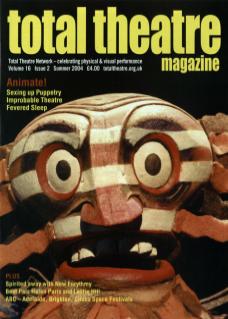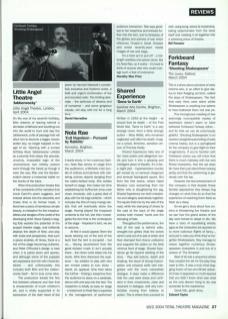On the eve of his seventh birthday, Milo dreams of leaving behind a domestic childhood and travelling out into the world to hunt and slay the Jabberwock, a rite of passage that will allow him to become a bigger, braver, bolder boy, no longer trapped in the age of six. Opening with a surreal birthday ritual, Jabberwocky unfolds as a journey that obeys the peculiar, uncanny, impossible logic of the unconscious: two military prawns swim through the forest as though it were the sea; Milo and the Bandersnatch dance a horizontal ballet on the trunks of the trees.
When this production breaks free of the constraints of the narrative that Lewis Carroll's poem suggests, and instead delves into the absurdity and chaos that is its formal heart, it becomes a piece of wondrous simple beauty, a metaphor for the inexplicabilities and dangers of the world of the developing child. Steve Tiplady's staging fully exploits the potential of the puppet theatre stage, and brilliantly deploys the depth of field, and play with scale and perspective, that such a space enables. At times, there is a risk of the stage becoming cluttered, and Peter O'Rourke's design is best when it is pared down and sparse, and although some of the puppets are expressive and rich with character, others – and unfortunately this includes both Milo and the Jabberwocky itself – fail to truly come alive.
The production treads the fine line between pleasure and fear that is characteristic of much children's art, and is vitally supported in its exploration of the dark heart of the poem by Hannah Marshall's wonderfully evocative and rhythmic score, a bold and urgent combination of live and recorded cello. This thrilling darkness – the darkness of dreams and of nonsense – and some gorgeous visuals, will stay with me for a long time.

